- Home
- Jacqueline Wilson
Diamond Page 3
Diamond Read online
Page 3
‘I want to whisper, Pa,’ I said, clutching his head. ‘I can’t dance, Pa,’ I hissed into his large ear. ‘I don’t know how, not really.’
‘Well, do us a turn then! All these gentlemen want to see you perform. Go on, and I’m sure one of them will give you a penny.’
‘Go on! Go on, go on, go on!’ they chorused, though the barmaid tried to hush them.
‘Leave the little maid alone!’ She turned to me. ‘I should run off home to your mother, dearie.’
But I couldn’t run with Pa holding me fast, and I was scared of returning with an empty tankard. Mary-Martha would be cross with me. She might hit me over the head – and if she happened to be wearing her sewing thimble, this hurt a great deal.
So I stayed. I started to sing them a song, because there wasn’t much else I could do standing so precariously in a pool of beer, but Pa wrinkled his nose as soon as I’d lisped the first line of Praise My Soul, the King of Heaven.
‘No, we want none of that holy stuff. This isn’t a preaching house!’ he said. ‘Sing another song!’
I didn’t know any songs that weren’t holy. Ma was the only one who sang in our house. I couldn’t sing, I couldn’t dance, so I did the only trick I could think of. I arched my back and lowered myself right over until my hands touched the ground and I was bent over backwards like a crab. Then I took the weight on my hands and stood upside down, hoping the ends of my long hair wouldn’t dangle in the spilled beer.
There was an astonished silence. I hoped they weren’t too shocked. I’d tried to tuck my skirts between my knees so I wouldn’t show off my drawers. I started trembling, scared that Pa would think I was being immodest. Ma had always shouted at me when she caught me doing handstands. Mary-Martha had been very prim with me too, though Matthew, Mark and Luke had always egged me on and begged me to teach them how to do it.
I didn’t know how to teach them. No one had taught me. I was just born like that. As soon as I’d learned to stagger about on my feet when I was one, I was forever rolling and tumbling. In a couple of years I could stand steady on my hands for a minute or more.
Nowadays I could stand on my hands just as easily as on my feet, but when one of the men saw me trembling, he cried, ‘Set her the right way up, for pity’s sake, or she’ll tumble. Look, she’s shaking! She’s about to fall!’
Pa seized hold of me and whisked me upright again. The men were all staring at me, jaws gaping. Then they started clapping and cheering with gusto.
Pa poked me. ‘Give them a bow then!’
So I bowed, and bobbed them a curtsy for good measure. This made them laugh and clap more. Even the barmaid clapped and told me I was a little wonder.
‘She should be a circus girl with a talent like that!’ she said.
She really did say it, Hetty. And I was such a silly fool that I took it as a great compliment. I turned cartwheels around the room, till Pa grew impatient and the men went back to their beer.
‘Settle down now, Baby. No more pretty little turns. That’s enough now,’ he told me.
But he still didn’t let me go. He held me tight while another hour or two ticked by. I had not learned to tell the time properly, but I watched the large grandfather clock in the alehouse with alarm even so, knowing it was getting later and later.
Pa was watching it too, all the while drinking steadily. He’d long run out of money for his own beer, but the men in the alehouse treated him to wet the new baby’s head.
‘Will it be here yet, do you think?’ Pa asked me, ridiculously, because how would I know? ‘And your ma – she will be all right, won’t she?’
‘Yes, Pa,’ I said, because I was too small and foolish to know otherwise. I wasn’t really bothering about poor Ma, though I certainly hoped she’d stopped groaning. I was more worried about the witchy midwife, deprived of her pint of ale – and Mary-Martha and that thimble.
‘You’d think one of those pesky boys would have come running to tell me the good news,’ said Pa. ‘Useless lummocks, the lot of them. Beats me why your ma was so desperate to have another.’
Here was something I was sure I understood. ‘She wants to have a John to have her full set of Holy Gospels, Pa,’ I said brightly.
‘Oh, don’t you start that madness too. Why my Lizzie had to get all holy in the head is still a puzzle to me, especially when I think of where she came from and what she was a-doing of then,’ said Pa.
I didn’t know what he was talking about – I still don’t – but I stroked Pa’s coarse shirtsleeve in silent sympathy. When I saw the tears gathering in his eyes and rolling down his ruddy cheeks, I tried to dab them away with my sleeve.
I was bewildered by his quick changes of mood and uncertain how to cope. I was feeling miserable too: worried about the situation at home – and, if I’m honest, even more concerned about my white kid shoes, which were clearly ruined now. I was close to weeping myself.
‘Look at the pair of you!’ said the barmaid. ‘Why don’t you take the little lass home, Samuel?’
‘Because I’m a-feared,’ he wept. ‘I’m not sure the baby will be borned yet.’
‘Well, there’s only one way to find out,’ she said. ‘Away with you!’
So we shambled out of the alehouse, Pa swaying, clinging to me. He was tall and I was particularly small, so he staggered, bent over, all the way home. He fell twice, and I had to take a tumble with him, getting my pinafore covered in mud, which made me even more anxious about my reception at home.
But when we turned the corner of our lane, we saw Matthew, Mark and Luke sitting on the wall outside our house kicking their heels, and Mary-Martha standing there too, with a white woollen bundle in her arms.
‘Oh, Pa! It’s all right! The baby’s here!’ I cried, and I started tugging him along.
The white parcel contained a tiny baby bawling its head off. Its face was an extraordinary shade of tomato and I thought it very ugly.
‘Is it . . . John?’ I asked breathlessly.
Mary-Martha nodded.
‘Oh, thank goodness!’ I said. But Mary-Martha was as white as the infant’s shawl, and my three big brothers all looked as if they’d just had a whipping.
‘How’s your ma?’ Pa asked.
They looked at each other fearfully. Pa gave an extraordinary howl and blundered into the house. I followed him, terrified. I could hear him upstairs, groaning and crying. But Ma wasn’t making a sound.
MA WAS DEAD. Somehow I felt it was all my fault. If I’d hurried back home with a full tankard of ale, then the midwife might have felt so refreshed she’d have figured out a way of saving Ma instead of letting her bleed to death. It was my fault for behaving like a little circus monkey when my poor ma was sinking fast. It was my fault because I hadn’t been brave enough to hold Ma’s hand and help her, like Mary-Martha. It was my fault because I’d been such a disappointing baby that Ma had been desperate to have another child. Oh, it was my fault, my fault, my fault.
You’re very kind to tell me otherwise, Hetty, but whatever the truth is, I still felt dreadfully to blame. I’m afraid Pa blamed me too.
I did not quite understand at first. I was kept busy running errands and helping Mary-Martha tend the new baby. He cried a great deal of the time, as if he were missing Ma too. A neighbour woman with a new babe of her own offered him a few feeds during the daytime and showed Mary-Martha how to give him a drink out of a bottle, but he was ailing and fretful in spite of all our efforts.
Pa borrowed money for the funeral, sending Ma off in style and kitting us all out in black, even giving the newborn baby a black shawl and a little black bonnet for his head. The baby cried all through the ceremony, and I cried too, wishing I could climb inside the hard wooden coffin and beg Ma’s forgiveness. Mary-Martha didn’t cry tears but her nose went very red and she frowned excessively. Matthew and Mark blubbed a little in an awkward, furtive way, knuckling their eyes and wiping their noses with their fists, but Luke cried more decorously, tears rolling gently down his pal
e cheeks. He dabbed at them in a dainty fashion with a lace handkerchief – Ma’s best one, which he’d stolen for himself.
All the mourners patted him on the head and cooed over him. Even the undertakers admired him.
‘That’s a lovely little lad you’ve got there, sir. He’s crying very decoratively indeed, bless him,’ said the man in charge. He was very thin and tall, and his black top hat with trailing ribbon was the thinnest, tallest hat I’d even seen. He was like an animated lamppost. He didn’t bend when he patted Luke’s head, he simply loomed above him.
‘You’re a dear little chap, aren’t you?’ he said. ‘Terrible tragedy for this little lad and all his brothers and sisters to lose their dear mother.’ He turned to Pa. ‘Please accept my sincere condolences, sir.’
Pa barely nodded. He was crying hard himself, but he’d drunk so much beer the night before, he reeked like an alehouse. You expected his very tears to trickle golden-brown.
‘It’s going to be very hard on you, sir, with all these little ones to feed and clothe and care for. How exactly are you going to manage?’
Pa gave a heartfelt groan and shook his head.
‘I’m not meaning to twist the knife, sir, especially at such a moment, but if you should see fit to farm out any of your young folk as apprentices, to give them a fine start in life and ease the burden on your good self, then might I be first in line for the services of that little lad there – the one crying so piteously in such a pretty manner? How does he manage it? His little eyes are still so blue instead of red, and his tiny pink nose is free of slime! I can see you’ve done your very best to clothe him decent for the funeral, but imagine him in a fine black suit of well-cut worsted, with a fancy white collar and a black satin bow at his throat. Imagine a tiny top hat on those curls as a finishing touch. What a picture he’d look! In short, he’d make a marvellous miniature mute.’ He emphasized each ‘m’ of these last three words so that it sounded as if he were humming.
Pa was barely listening, naturally concentrating on the ordeal of Ma’s funeral. I found the ceremony bleak, but I was sure that Ma, inside her wooden coffin, would be appreciating all the hymn singing and holy words. I was horrified when we all trooped out into the churchyard and I realized that all these men were intent on lowering Ma into a big hole in the ground.
‘No! No, please stop! You can’t put Ma in all that mud and dirt!’ I cried out.
‘Hold your tongue and stop shaming us,’ Pa hissed at me.
I tried to take his hand, but he pulled away from me as if he couldn’t bear my touch. I nuzzled close to Mary-Martha instead, but she had her arms full of baby John and could not pick me up to comfort me.
I felt so lonely standing there, though I had my family all around me. I wanted Ma. I stared at her coffin, willing her to lift the lid and climb out and wipe my tears away. But she stayed inside, and soon her coffin was covered in ugly clods of earth. I realized there was going to be no more Ma ever.
I seemed to have lost my pa too. He would have nothing to do with me, covering his eyes with his hand as if the very sight of me offended him. He used to take pride in my long fair hair, but now he said to Mary-Martha, ‘Tell your sister to tie up that hair and cover her head with a scarf.’ He would not speak to me directly, even when I stood in front of him.
‘Pa!’ I shouted, wondering if he simply couldn’t hear me.
He pushed me away roughly. ‘Tell your sister I want none of her fancy tricks,’ he said to Mary-Martha. ‘Hasn’t she done enough harm, cavorting with me inside an alehouse when her own dear mother was gasping her last breath?’
‘But Pa, that’s not really fair,’ said Mary-Martha, because she was a kind sister, and brave too: since Ma died Pa had been terrifyingly easy to upset. One word out of place and he’d seize you and smack you. All the boys except baby John had suffered Pa’s belt in a matter of days.
Mary-Martha’s soft entreaty was in vain. Pa had made up his mind about me and there was nothing I could do but keep out of his way. Mary-Martha was his favourite child now. She couldn’t help looking proud whenever he beckoned her and called her his little darling and his special helpmeet.
He certainly couldn’t have managed without her. She looked after baby John, she did the cooking, she did the washing, she did the cleaning. I helped, of course, and the boys could sometimes be persuaded to scrub the floor or go on errands, but mostly they ran wild, especially when Pa was away selling his tracts.
He stopped making angels. He swept Ma’s collection to the floor one drunken night and stamped them all into powder. I was terrified, but I was glad they were gone. They had all started staring at me accusingly with their Prussian-blue painted eyes.
Pa did not make as much money now, and he drank nearly all of it away each night in the alehouse. We could not pay the rent on our dear little house, so we had to move to Willoughby Buildings, on the other side of town by the gasworks and the tannery, where all the really poor folk lived.
If Ma had known, she’d have flooded her coffin with her tears. We were now living in a den of drunks and thieves. But now Pa was a drunk himself and the boys were becoming thieves. At first they pilfered childish stuff – apples from the market stalls, sugary confections from the sweet shop, marbles from the toy shop, just dashing in and grabbing what they fancied – but soon Matthew and Mark and Luke joined up with a gang of big boys from the buildings and embarked on more organized crime, snatching purses and stealing cash.
Mary-Martha and I knew what they were up to, of course. They didn’t have enough sense to keep things quiet, openly boasting about their exploits and showing off their newly acquired possessions.
‘You’re bad, wicked boys,’ said Mary-Martha. ‘What does the Good Book say? Thou shalt not steal!’ She took after Ma and was very pious.
I wasn’t pious at all, but I was fearful. ‘You’ll go to H-e-l-l, boys,’ I said. ‘And you’ll burn in flames for all eternity.’
‘Then at least we’ll be warm,’ said Matthew.
It was winter now, but we had no fuel for a fire and big Matthew had no warm clothes, though Mark and Luke could wear his cast-offs. Mary-Martha and I had to make do with shawls over our summer dresses. Mary-Martha did fetch Ma’s best Sunday velvet from the trunk and ponder cutting it up to make a dress each for us, but she couldn’t bear to snip into the soft material. When we buried our faces in it, we could still faintly smell our ma.
Mary-Martha did cut down a petticoat and an old grey singlet and fashioned them into a lumpy rag doll with a lacy dress. ‘This can be your baby, Ellen-Jane,’ she said kindly, because she was feeling sorry for me.
‘Thank you so much, Mary-Martha,’ I said, and clutched the doll to my chest. ‘I shall call her Maybelle.’
She had no features on her poor grey face, and therefore didn’t seem to have much personality at all, but she was stitched with love – and I was starved of that now. I took her to bed with me each night and carried her around everywhere, like a baby’s comforter.
Of course the boys’ luck couldn’t last. All three of my brothers were caught red-handed burgling an old gentleman’s house. The other boys in the gang had legged it out of the window before the constable caught them. My brothers had fought to get free, but he had coshed them into submission.
Pa went white with fury when he was told that they were in a prison cell, branded common criminals, with our Matthew up on an added charge of assault and battery. ‘Your poor dear mother must be turning in her grave,’ he said when he went to visit them.
They all cried with shame, even Matthew. Little Luke cried so piteously that the police sergeant softened.
‘I can tell they’re not truly bad lads,’ he said. ‘If you’re willing to pay a shilling fine for each of them, we’ll let them go with a caution, Mr Potts.’
I don’t know how Pa got the money together – maybe he had to steal himself – but he managed to pay for all three boys to be released.
‘I’m teaching you a lesson here a
nd now, boys,’ he told them. ‘I’m not having you grow up to be thieving varmints. I’m going to get you trained up to be good God-fearing lads for the sake of your mother. She named you after the Gospels because she revered Jesus and his disciples. What does the holy tract say? Go ye and do likewise! So that’s what you’re going to do. Matthew, step forward!’
Matthew shambled up to Pa, hanging his head, his long arms dangling awkwardly.
‘You’re a strong boy – and those hands clearly throw a fierce punch already. I want to turn you into a proper man. What profession was our dear Lord raised in, Matthew?’
Matthew stared at Pa blankly. He hadn’t attended Sunday school for years.
‘He was a carpenter – a fine, skilled profession, and a way of channelling all that strength of yours. I’m apprenticing you to my old friend Micky Chip the carpenter. You’re to go and live with him and learn off him, you hear me?’
Matthew heard and dared not argue, though he didn’t look happy.
‘Now you, Mark,’ said Pa.
‘I don’t want to be a carpenter, Pa! I’m nowhere near as strong as Matthew,’ said Mark, showing Pa his puny arms.
‘Yes, you need building up, son. Do some honest work to grow some muscles. What did our Lord’s friends do for a living, boy?’
Mark looked astonished. ‘Do you want me to be a disciple, Pa?’
Pa struck him hard about the head for his stupidity. ‘Where did Jesus find his first disciples, dolthead? On the shores of Lake Galilee. He was a fisherman, a fine, honest profession.’
‘Is there a lake in London, Pa?’
‘Not that I know of, you fool. You’re not going out to fish, you’re going to work with them. I’ve apprenticed you to Sammy Barton down the market. You’ll go to Billingsgate with him every morning and help him run his wet-fish stall, do you hear me?’
Mark heard – and shook his head in horror. ‘I don’t like fish, Pa. Nasty slimy things!’
‘And I don’t like nasty slimy boys who bring shame on the family. You’ll do as I say and work hard for a living or you’ll be the one who’s gutted and has his head chopped off. Now, Luke!’

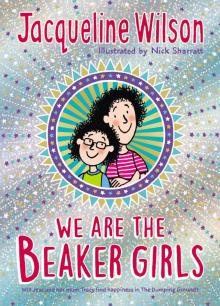 We Are the Beaker Girls
We Are the Beaker Girls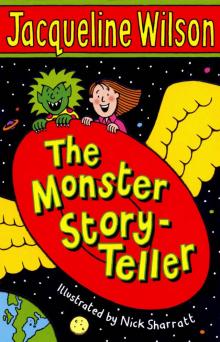 The Monster Story-Teller
The Monster Story-Teller The Worry Website
The Worry Website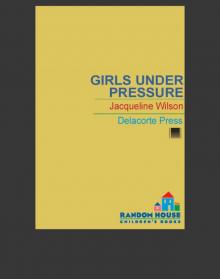 Girls Under Pressure
Girls Under Pressure Little Darlings
Little Darlings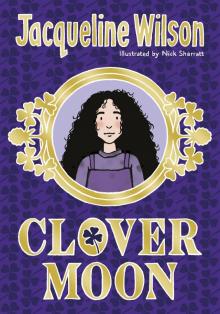 Clover Moon
Clover Moon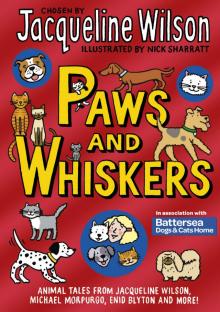 Paws and Whiskers
Paws and Whiskers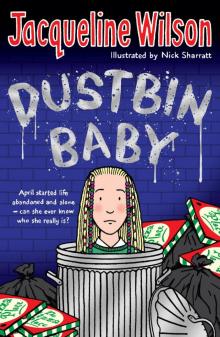 Dustbin Baby
Dustbin Baby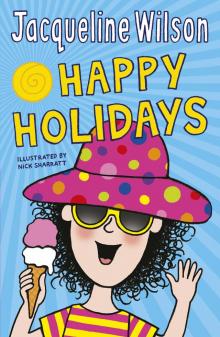 Jacqueline Wilson's Happy Holidays
Jacqueline Wilson's Happy Holidays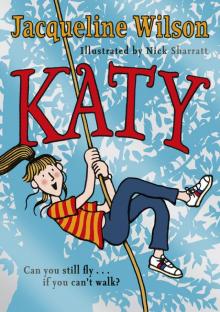 Katy
Katy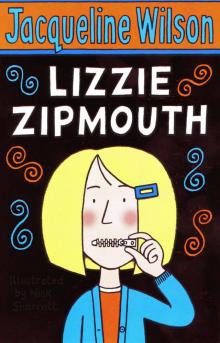 Lizzie Zipmouth
Lizzie Zipmouth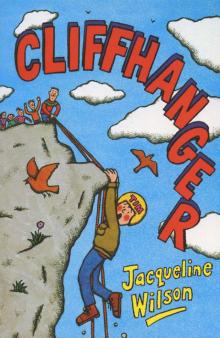 Cliffhanger
Cliffhanger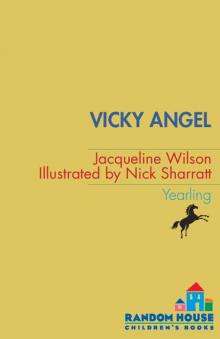 Vicky Angel
Vicky Angel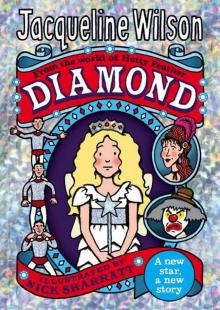 Diamond
Diamond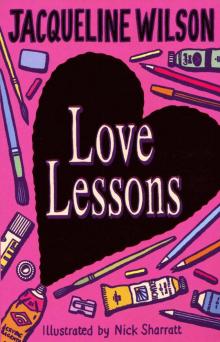 Love Lessons
Love Lessons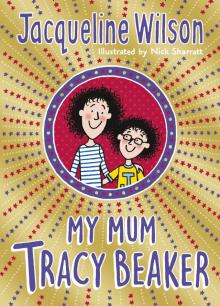 My Mum Tracy Beaker
My Mum Tracy Beaker Lola Rose
Lola Rose Jacky Daydream
Jacky Daydream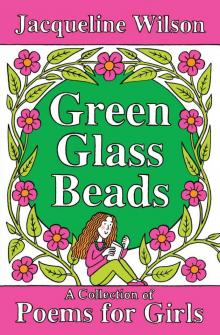 Green Glass Beads
Green Glass Beads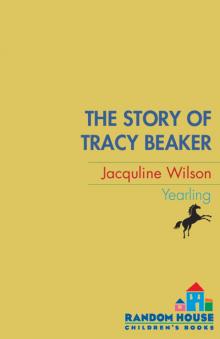 The Story of Tracy Beaker
The Story of Tracy Beaker Clean Break
Clean Break Longest Whale Song
Longest Whale Song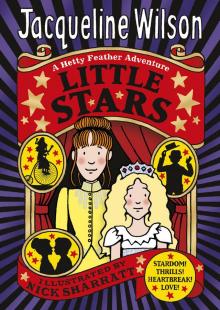 Little Stars
Little Stars Double Act
Double Act The Suitcase Kid
The Suitcase Kid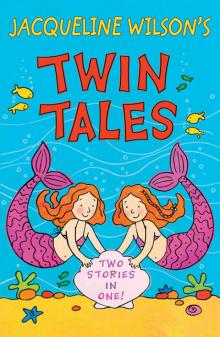 Twin Tales
Twin Tales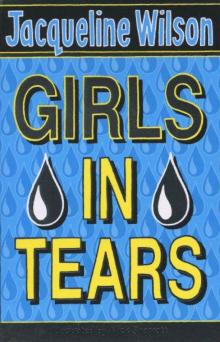 Girls in Tears
Girls in Tears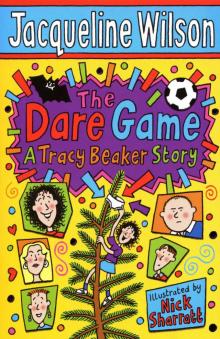 The Dare Game
The Dare Game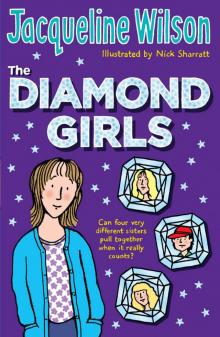 Diamond Girls
Diamond Girls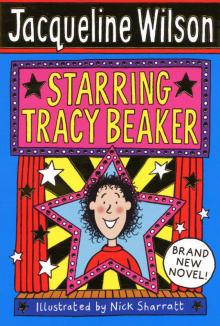 Starring Tracy Beaker
Starring Tracy Beaker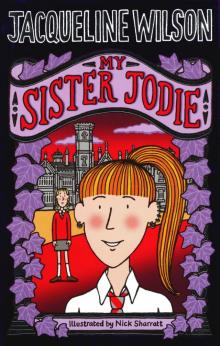 My Sister Jodie
My Sister Jodie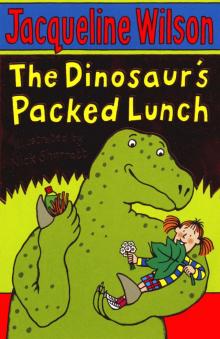 The Dinosaur's Packed Lunch
The Dinosaur's Packed Lunch Candyfloss
Candyfloss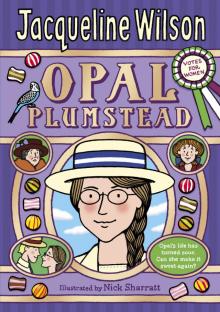 Opal Plumstead
Opal Plumstead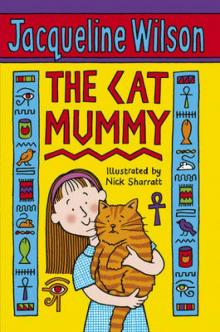 The Cat Mummy
The Cat Mummy Werepuppy and the Werepuppy on Holiday
Werepuppy and the Werepuppy on Holiday Hetty Feather
Hetty Feather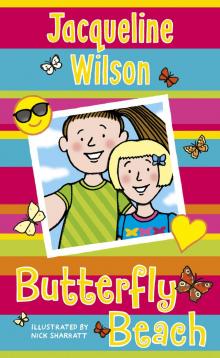 Butterfly Beach
Butterfly Beach Midnight
Midnight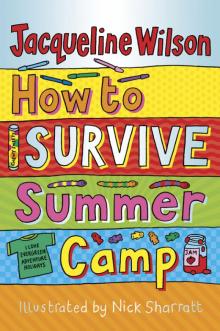 How To Survive Summer Camp (ePub)
How To Survive Summer Camp (ePub)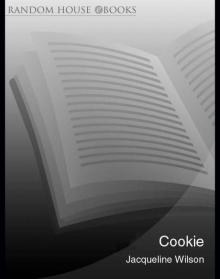 Cookie
Cookie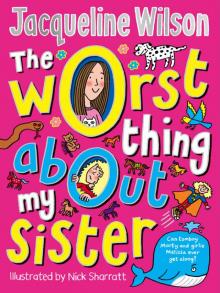 The Worst Thing About My Sister
The Worst Thing About My Sister Bad Girls
Bad Girls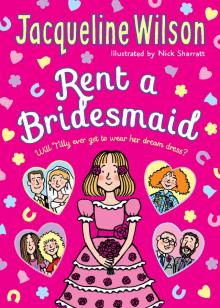 Rent a Bridesmaid
Rent a Bridesmaid Girls in Love
Girls in Love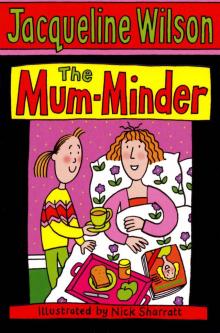 The Mum-Minder
The Mum-Minder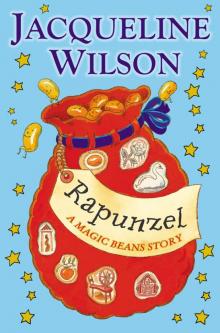 Rapunzel
Rapunzel Lottie Project
Lottie Project Best Friends
Best Friends Video Rose and Mark Spark
Video Rose and Mark Spark Glubbslyme
Glubbslyme Girls Out Late
Girls Out Late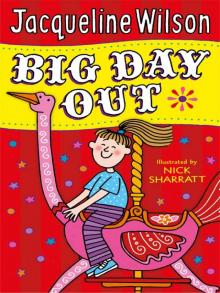 Big Day Out
Big Day Out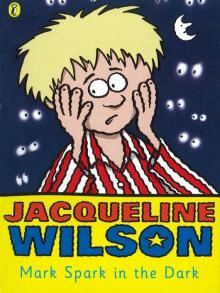 Mark Spark in the Dark
Mark Spark in the Dark Buried Alive!
Buried Alive!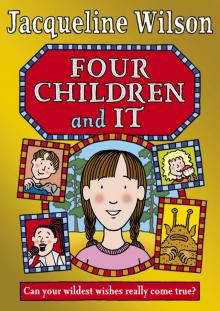 Four Children and It
Four Children and It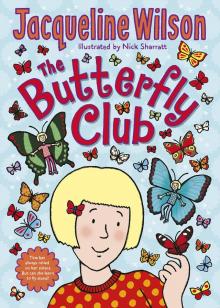 The Butterfly Club
The Butterfly Club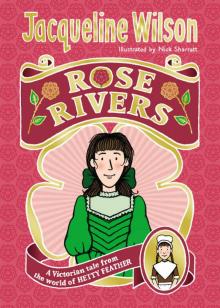 Rose Rivers
Rose Rivers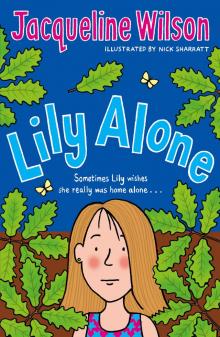 Lily Alone
Lily Alone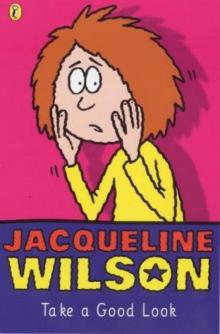 Take a Good Look
Take a Good Look My Secret Diary
My Secret Diary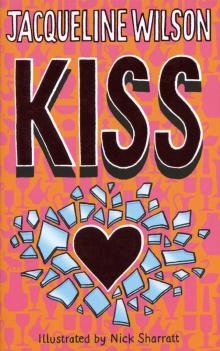 Kiss
Kiss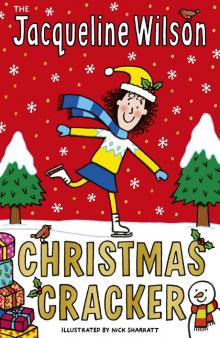 The Jacqueline Wilson Christmas Cracker
The Jacqueline Wilson Christmas Cracker The Worry Web Site
The Worry Web Site Emerald Star (Hetty Feather)
Emerald Star (Hetty Feather) The Bed and Breakfast Star
The Bed and Breakfast Star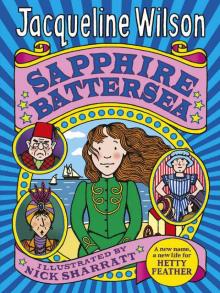 Sapphire Battersea
Sapphire Battersea Cat Mummy
Cat Mummy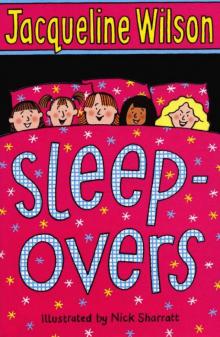 Sleepovers
Sleepovers Dare Game
Dare Game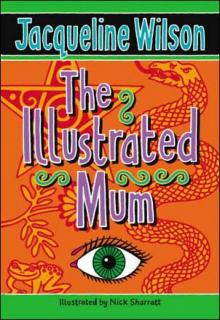 The Illustrated Mum
The Illustrated Mum Secrets
Secrets